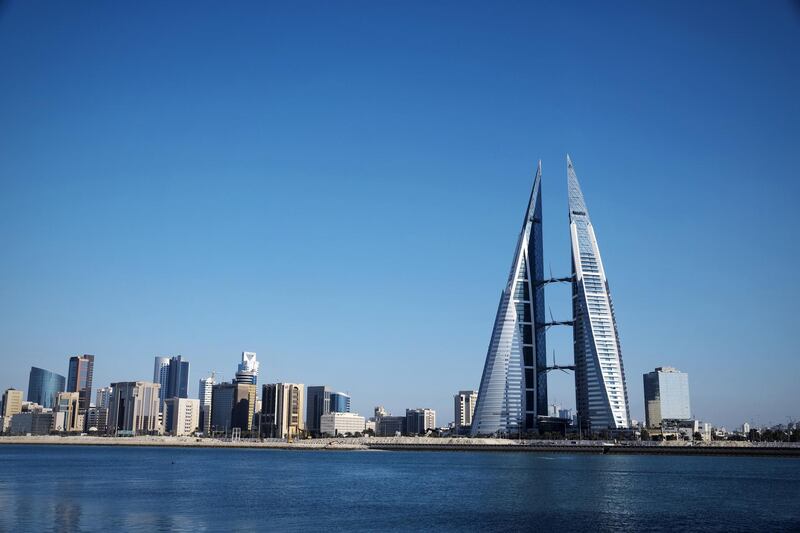Arabian Gulf allies have provided Bahrain a "lifeline" to stabilise its economy and prevent a potential credit crunch with a $10 billion aid package but it needs to deliver on fiscal reform targets to ensure sustainable progress, analysts said.
The assistance to Bahrain will provide short-term relief to the smallest Gulf economy, help avoid a currency devaluation, meet immediate debt payments, dispel speculation on the currency peg to the US dollar and allow it borrow on international debt markets at cheaper interest rates, analysts said. The support, which is tied to fiscal reforms, will allow Bahrain to focus on implementing measures to rein in its budget deficit.
"This is an important lifeline for the Bahraini economy and should allow policy makers time to continue the implementation of the reforms necessary to restructure the economy," Tarek Fadlallah, chief executive of Nomura Asset Management Middle East, said. "In the short term it will restore confidence but Bahrain will still have to successfully implement additional reform measures to convince long-term investors."
Saudi Arabia, UAE and Kuwait said on October 4 that they have agreed to support Bahrain's financing plan and stimulate economic growth in a five-year aid programme. Bahrain issued a 33-page financial programme aimed at eliminating its budget deficit by 2022, reducing public spending overseen by six task forces, introducing a voluntary retirement scheme for government employees, improving efficiency in state expenditure and streamlining cash subsidies to its citizens.
"The conditional support could be the game changer for Bahrain's economy that markets and credit rating agencies have been waiting for," Ehsan Khoman, head of Mena research and strategy at MUFG Bank, said. "The conditionality of the support package will provide much needed relief for markets given that investors will take more comfort in the forward-guidance structure of reform execution."
______________
Read more:
[ UAE, Saudi Arabia and Kuwait give $10bn to support Bahrain reforms ]
[ Bahrain bankruptcy law to spur foreign investment ]
_______________
Assistance by the Gulf countries will help avoid a currency devaluation that market-watchers fear could spill over to neighbouring oil-producing countries.
"It is in the interest of all GCC countries that the pressure on the Bahraini currency subside and that the peg to the dollar is maintained to avoid contagion or spillover effect," Garbis Iradian, Mena chief economist at Institute of International Finance, said.
The aid package will be a "vitamin supplement" to help revive the economy's health and is "the right start" in the road to recovery, Mazen Al Sudairi, head of research at Al Rajhi Capital, said.
However, the deep fiscal reforms required to rein in Bahrain's large fiscal and current account deficits could lead to weaker economic growth in the short-term, economists said.
MUFG Bank expects Bahrain's gross domestic product growth to decline to 1.5-2 per cent in 2018 and 2019 from 3.9 per cent last year.
"This is just the beginning of a tough journey," Mohamed Abdelmeguid, Mena analyst at Economist Intelligence Unit, said. "Growth in Bahrain is driven in large part by government spending, and any deep fiscal cuts will keep economic expansion in check at least initially."
The aid programme will only meet half of Bahrain's financing needs over the next years, with the rest financed predominantly through debt issuance.
Analysts warned against a slowdown in the pace of Bahrain's economic reform programme as oil prices rebound and Gulf financial aid pours in.
"Bahrain should not be complacent," Rami Sidani, head of frontier investment markets at asset management company Schroders, said. "They need to implement austerity measures and meet fiscal reform targets otherwise the situation is not sustainable."
Investor confidence in Bahrain is likely to be a "tale of two stories" where on one hand markets will welcome the aid package and confidence will be restored to the banks, Mr Abdelmeguid said. On the other hand, foreign investors will play "wait and see" until they are assured of the government's commitment to policy reforms, which takes time.
Long-term sustainable recovery means Bahraini authorities will need to reduce fuel subsidies, contain the public wage bill, rein in public spending, and introduce a five per cent VAT in 2019, said Mr Iradian.
"The focus of attention will now be on reform execution in line with the 'fiscal balance programme' to ensure that Bahrain’s operating model shifts to a more sustainable footing away from the reliance on hydrocarbons," Mr Khoman said.







